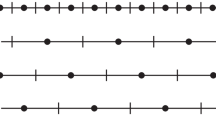Abstract
Implicit step-by-step methods for numerically solving the initial-value problem {y′=f(y),y(0)=y 0} usually lead to implicit relations of which the Jacobian can be approximated by a matrix of the special formK=I−hM ⊗J, whereM is a matrix characterizing the step-by-step method andJ is the Jacobian off. Similar implicit relations are encountered in discretizing initial-value problems for other types of functional equations such as VIEs, VIDEs and DDEs. Application of (modified) Newton iteration for solving these implicit relations requires the LU-decomposition ofK. Ifs andd are the dimensions ofM andJ, respectively, then this LU-decomposition is anO(s 3 d 3) process, which is extremely costly for large values ofsd. We shall discuss parallel iteration methods for solving the implicit relations that exploit the special form of Jacobian matrixK. Their main characteristic is that each processor is required to compute LU-decompositions of matrices of dimensiond, so that this part of the computational work is reduced by a factors 3. On the other hand, the number of iterations in these parallel iteration methods is usually much larger than in Newton iteration. In this contribution, we will try to reduce the number of iterations by improving the convergence of such parallel iteration methods by means of preconditioning.
Similar content being viewed by others
References
H. Brunner and P.J. van der Houwen,The Numerical Solution of Volterra Equations (North-Holland, Amsterdam, 1986).
K. Burrage, The error behaviour of a general class of predictor-corrector methods, Appl. Numer. Math. (1990)201–216.
K. Burrage, The search for the Holy Grail, or predictor-corrector methods for solving ODEIVPs, Appl. Numer. Math. (1992), to appear.
K. Burrage, Efficient block predictor-corrector methods with a small number of iterations, J. Comp. Appl. Math. (1993), to appear.
K. Burrage and J.C. Butcher, Nonlinear stability of a general class of differential equations methods, BIT 20(1980)185–203.
J.P. Coleman and R.A. Smith, The Faber polynomials for circular sectors, Math. Comp. 49(1987)81–84; 231–241.
M.R. Crisci, P.J. van der Houwen, E. Russo and A. Vecchio, Block methods for second-kind Volterra equations, in preparation.
P.J. van der Houwen, Parallel step-by-step methods, Appl. Numer. Math. 11(1993)69–81.
P.J. van der Houwen, C. Boon and F.W. Wubs, Analysis of smoothing matrices for the preconditioning of elliptic difference equations, Z. angew. Math. Mech. 68(1988)3–10.
P.J. van der Houwen and Nguyen huu Cong, Parallel block predictor-corrector methods of Runge-Kutta type, Report NM-R9220, Centre for Mathematics and Computer Science, Amsterdam (1992).
P.J. van der Houwen and B.P. Sommeijer, Parallel iteration of high-order Runge-Kutta methods with stepsize control, J. Comp. Appl. Math. 29(1990)111–127.
P.J. van der Houwen and B.P. Sommeijer, Iterated Runge-Kutta methods on parallel computers, SIAM J. Sci. Stat. Comput. 12(1991)1000–1028.
K.R. Jackson and S.P. Nørsett, The potential for parallelism in Runge-Kutta methods, Part I: RK formulas in standard form, Technical Report No. 239/90, Department of Computer Science, University of Toronto (1990).
A. Jameson, The evolution of computational methods in aerodynamics, J. Appl. Mech. 50(1983)1052–1076.
A. Lerat, Une classe de schémas aux différence implicites pour les systèmes hyperboliques de lois de conservation, C.R. Acad. Sci. Paris 288 (Série A) (1979)1033–1036.
S.P. Nørsett and H.H. Simonsen, Aspects of parallel Runge-Kutta methods, in:Numerical Methods for Ordinary Differential Equations, Proc., L'Aquila 1987, ed. A. Bellen, C.W. Gear and E. Russo, LNM 1386 (Springer, Berlin, 1989).
E. Turkel, Acceleration to a steady state for the Euler equations, in:Numerical Methods for the Euler Equations of Fluid Dynamics (SIAM, Philadelphia, 1985) pp. 218–311.
F.W. Wubs, Stabilization of explicit methods for hyperbolic partial differential equations, Int. J. Numer. Meth. Fluids 6(1986)641–657.
Author information
Authors and Affiliations
Additional information
This paper is presented as an outcome of the LMS Durham Symposium convened by Professor C.T.H. Baker on 4–14 July 1992, with support from the SERC under grant reference number GR/H03964.
Rights and permissions
About this article
Cite this article
van der Houwen, P.J. Preconditioning in implicit initial-value problem methods on parallel computers. Adv Comput Math 1, 39–60 (1993). https://doi.org/10.1007/BF02070820
Received:
Issue Date:
DOI: https://doi.org/10.1007/BF02070820




